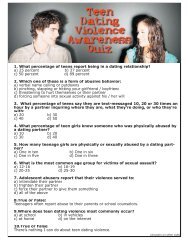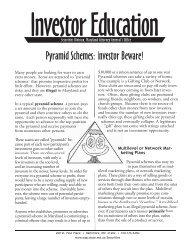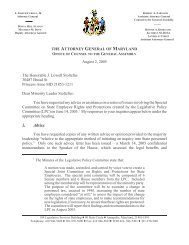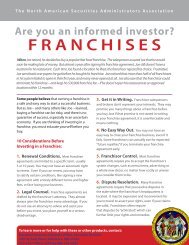Linda H. Lamone, Administrator - Maryland Attorney General
Linda H. Lamone, Administrator - Maryland Attorney General
Linda H. Lamone, Administrator - Maryland Attorney General
Create successful ePaper yourself
Turn your PDF publications into a flip-book with our unique Google optimized e-Paper software.
Mdavis@oag.state.md.us<br />
E-MAIL<br />
J. JOSEPH CURRAN, JR. DONNA HILL STATON<br />
<strong>Attorney</strong> <strong>General</strong> MAUREEN M. DOVE<br />
(410) 576-7036 (410) 576-6356<br />
<strong>Linda</strong> H. <strong>Lamone</strong><br />
<strong>Administrator</strong>, State Board of Elections<br />
P.O. Box 6486<br />
Annapolis MD 21401-0486<br />
Dear Ms. <strong>Lamone</strong>:<br />
STATE OF MARYLAND<br />
OFFICE OF THE ATTORNEY GENERAL<br />
June 8, 2006<br />
You have requested advice relating to an effort to petition to referendum two bills<br />
relating to early voting. On May 31, 2006, <strong>Maryland</strong>ers for Fair Elections (MFE) submitted<br />
signatures in an effort to satisfy the constitutional requirement that they file one-third of the<br />
necessary signatures by that date to petition those bills to referendum. You ask:<br />
(1) May Senate Bill 478 of the 2005 Session be referred to referendum for the<br />
2006 ballot and, if it is not referable, should the filed petition signature pages be verified?<br />
(2) When will House Bill 1368 of the 2006 Session take effect pursuant to Section<br />
2 of the Article XVI of the <strong>Maryland</strong> Constitution if MFE ultimately submits the required<br />
number of signatures to petition that bill to referendum?<br />
In our view, the answers to your questions are as follows:<br />
Deputy <strong>Attorney</strong>s <strong>General</strong><br />
TELECOPIER NO. WRITER’S DIRECT DIAL NO.<br />
(1) Senate Bill 478 (2005) may not be referred to referendum at this time because<br />
a referendum effort must occur immediately after the regular session at which the legislation<br />
is initially passed. Thus, the required signatures should have been filed no later than June<br />
1, 2005. In addition, because most of the provisions of Senate Bill 478 were subsequently<br />
amended by House Bill 1368 (2006), those provisions of the bill may not be petitioned to<br />
referendum. However, because the timing of the referendum drive in these circumstances<br />
is an issue of first impression, we recommend that the local boards of election proceed to<br />
verify signatures so that the referendum process may continue without interruption in the<br />
event that a court reaches a different conclusion.
June 8, 2006<br />
Page 2<br />
(2) House Bill 1368 (2006) was enacted as an emergency law and thus will remain<br />
in effect despite the petition; it will be repealed 30 days after the election if it is rejected by<br />
a majority of the voters at the November election.<br />
Background<br />
Enactment of Bills<br />
Senate Bill 478 (2005), Chapter 5, Laws of <strong>Maryland</strong> 2006, created a new §10-301.1<br />
of the Election Law Article (“EL”) of the Annotated Code. The bill provided for early voting<br />
eight hours each day beginning the Tuesday before a primary or general election through the<br />
Saturday before the election at early voting places and required each local board of election<br />
to establish the early voting places in its county, including at least three such places in the six<br />
most populous counties in the State and in Baltimore City. The bill was passed by both<br />
houses as of April 9, 2005, and vetoed by the Governor on May 20, 2005. The veto was<br />
overridden by both houses as of January 17, 2006; the bill therefore became law effective<br />
February 16, 2006 pursuant to Article II, §17(d) of the Constitution.<br />
1<br />
House Bill 1368 (2006), Chapter 61, Laws of <strong>Maryland</strong> 2006, among other things,<br />
repealed and reenacted with amendments EL §10-301.1(b) and (c) and thereby modified the<br />
law created by Senate Bill 478 in several respects: it extended the early voting period to<br />
between 7 a.m. and 8 p.m. each day; it specified the sites in each of the seven most populous<br />
jurisdictions where early voting is to occur; it required early voting in other counties of the<br />
State to take place in the county seat (except in Charles County, where the early voting place<br />
2<br />
is to be in Waldorf) ; and directed the state and local boards to inform the public about early<br />
3<br />
voting and the location of early voting polling places in each county. House Bill 1368<br />
1 Article II, §17(d) provides in pertinent part: “Any Bill enacted over the veto of the<br />
Governor, or any Bill which shall become law as the result of the failure of the Governor to act<br />
within the time specified, shall take effect 30 days after the Governor’s veto is over-ridden, or on the<br />
date specified in the Bill, whichever is later. If the Bill is an emergency measure, it shall take effect<br />
when enacted.”<br />
2<br />
The State <strong>Administrator</strong> of Elections is to select another site “proximate to the site rejected,<br />
that is accessible to voters” if the <strong>Administrator</strong> determines, or a local election director provides<br />
notice, that a site specified cannot be used to accommodate early voting. EL §10-301.1(c)(3).<br />
3<br />
House Bill 1368 also contained provisions relating to issues that Senate Bill 478 did not<br />
address, such as the requirements that the powers and duties of the State Board of Elections be<br />
exercised by a supermajority of its members, EL §2-102(c); that a local board establish a separate<br />
precinct to serve colleges and universities, EL §2-203(a)(2)(i); and that each polling place be<br />
equipped with computers that contain records of registered voters in the county that is networked to
June 8, 2006<br />
Page 3<br />
passed both houses as emergency legislation as of March 29, 2006. The Governor vetoed the<br />
bill on April 7, 2006. However, both houses overrode the veto as of April 10, 2006 and thus<br />
the bill became effective immediately pursuant to Article II, §17(d) of the Constitution.<br />
Advance Determination<br />
On April 19, 2006, MFE requested an advance determination under EL §6-206 of the<br />
4<br />
accuracy of its proposed summaries for the petitions as to the two bills. On April 25, 2006,<br />
this Office provided comments on the summaries and called attention to matters that related<br />
to whether these bills may ultimately be petitioned to referendum. In particular, in the<br />
context of a possible petition drive relating to a different bill, this Office had previously<br />
concluded that a petition drive for a referendum must occur immediately after the session of<br />
the Legislature at which the bill is initially passed by the <strong>General</strong> Assembly. See Letter from<br />
Assistant <strong>Attorney</strong>s <strong>General</strong> Robert A. Zarnoch and Bonnie A. Kirkland to Honorable<br />
Donald H. Dwyer, Jr. (April 26, 2005) (“Dwyer letter”) (copy attached). In addition, in a<br />
1977 opinion, <strong>Attorney</strong> <strong>General</strong> Burch concluded that, if the <strong>General</strong> Assembly repeals or<br />
amends a referred bill in good faith, a referendum concerning the original legislation should<br />
be removed from the ballot. See 62 Opinions of the <strong>Attorney</strong> <strong>General</strong> 405 (1977) (“1977<br />
Opinion”).<br />
Analysis<br />
Timeliness of the Petition Drive<br />
We first address whether MFE’s attempt to commence the referral of Senate Bill 478<br />
(2005) to referendum by filing signatures on May 31, 2006, is timely. In the Dwyer letter,<br />
our Office provided advice regarding a similar set of facts. There, the issue was whether a<br />
successful referendum effort in 2005 in regard to the Medical Decision Making Act of 2005<br />
would be blocked by a veto override in 2006 and whether such events would necessitate a<br />
new referendum drive. This Office advised that one-third of the necessary signatures would<br />
have to be filed before June 1, 2005, (with the remainder filed before June 30, 2005) and that<br />
a referendum drive could not begin in 2006 following a possible legislative override of a veto<br />
other computers. EL §10-302(b). The bill also contained a number of provisions relating to election<br />
administration in Baltimore City only. See House Bill 1368, Sections 2 and 5.<br />
4<br />
Under Article XVI, §4 of the Constitution, each paper that is part of the petition “shall<br />
contain the full text, or an accurate summary approved by the <strong>Attorney</strong> <strong>General</strong>, of the Act or part<br />
of Act petitioned.” Similarly, under EL §6-201(c)(2), each signature page of such a petition must<br />
contain either “a fair and accurate summary of the substantive provisions of the proposal” or “the<br />
full text of the proposal.”
June 8, 2006<br />
Page 4<br />
of the bill. The Dwyer letter concluded that, even if the bill were to be vetoed in 2005, it<br />
would be necessary for the referendum signatures to be validated at the same time. 5<br />
We believe the analysis in the Dwyer letter applies with respect to Senate Bill 478<br />
(2005). As noted, Senate Bill 478 was vetoed by the Governor on May 20, 2005, but the veto<br />
was later overridden and the bill became effective February 16, 2006. An effort to petition<br />
a bill to referendum is governed by Article XVI of the Constitution. Section 1(a) of Article<br />
XVI makes it clear that a bill that becomes effective over the veto of the Governor may be<br />
6<br />
petitioned to referendum. However, the Article makes no further reference to a veto or<br />
override and instead addresses petition-gathering in all circumstances and governing timeframes.<br />
In particular, §2 states that, except for an emergency law, no law shall take effect<br />
“until the first day of June next after the session at which it may be passed.” Section 2 also<br />
states that such a law shall be referred to the voters if a referendum petition is filed before<br />
“said first day in June.” For a public general law, §3(a) requires the collection of signatures<br />
of three percent of qualified voters and §3(b) provides for the filing of one-third of such<br />
signatures before the first day in June, with the time extended to June 30 for the balance of<br />
the signatures. The effect of a successful petition drive is to suspend the bill petitioned,<br />
unless it is emergency legislation.<br />
As outlined in the Dwyer letter, there are several possible interpretations of Article<br />
XVI as it applies to the timing of a referendum. Under one possible reading, MFE’s filing<br />
of signatures a year after the veto would be timely because petitioners were not required to<br />
do anything unless and until the veto was overridden, which did not happen until January 17,<br />
2006. However, this prolonged period of signature-gathering is at odds with Article XVI,<br />
§2's focus on the June 1st “after the session at which [the bill] may be passed.” Article XVI,<br />
§2.<br />
Another possible reading of Article XVI is that the <strong>General</strong> Assembly’s override of<br />
the Governor’s veto triggers a new right to gather signatures until May 31 (or June 30) of the<br />
5<br />
At the time that the advice was given, the Governor had not acted on the bill. The Governor<br />
subsequently vetoed the bill on May 20, 2005; the Legislature did not override that veto. No<br />
referendum petition or signatures were ever filed with respect to the bill.<br />
6<br />
Section 1(a) provides:<br />
The people reserve to themselves power known as The Referendum, by petition to<br />
have submitted to the registered voters of the State, to approve or reject at the polls,<br />
any Act, or any part of any Act of the <strong>General</strong> Assembly, if approved by the<br />
Governor, or, if passed by the <strong>General</strong> Assembly over the veto of the Governor.<br />
<strong>Maryland</strong> Constitution, Article XVI. (emphasis added)
June 8, 2006<br />
Page 5<br />
subsequent year. In support of such an interpretation, §3(c) of Article XVI defines passage<br />
as “any final action” by both houses and does not include a veto override in the definition of<br />
7<br />
“enactment.” However, these definitions were not added to Article XVI until 1976 and are<br />
unrelated to the interplay between a veto override and a referendum effort.<br />
In 1976, §3 was amended in three principal respects: the number of signatures<br />
required to be submitted before June 1 was reduced from one-half to one-third; the legislation<br />
defined “pass” and “passed” to mean any final action by both houses of the <strong>General</strong><br />
Assembly and “enact” and “enacted” to mean approval of an act by the Governor; and<br />
signatures on a petition for referendum were expressly authorized at any time after the act<br />
is passed. See Chapter 548, Laws of <strong>Maryland</strong> 1976, ratified Nov. 2, 1976. The intent of the<br />
legislation was apparently to ensure an adequate time to gather signatures on a referendum<br />
petition before the effective date of the bill. Thus, under Article XVI, a new law (other than<br />
an emergency measure), if properly petitioned to referendum, does not take effect until the<br />
voters have spoken.<br />
If the Constitution were construed to provide for petition drives to begin after a veto<br />
override, it would likely result in such bills becoming effective for several months and then<br />
suddenly being suspended if the requisite number of valid signatures were obtained. In the<br />
case of Senate Bill 478,which took effect on February 16, 2006, or thirty days after the veto<br />
st<br />
override, the legislation would be suspended on June 1 . This seems at odds with the scheme<br />
set out in Article XVI. For example, emergency legislation that has already become effective<br />
is not suspended by the submission of petitions signed by a relatively small percentage of the<br />
electorate; rather, such legislation remains effective until rejected by a majority of voters at<br />
the polls. In addition, under such a construction of the Constitution, the organizers of a<br />
petition drive would likely have more than double the amount of time that the framers<br />
8<br />
deemed adequate for gathering signatures for bills that were not vetoed. This possible<br />
interpretation thus appears illogical and contrary to the basic scheme of Article XVI.<br />
7<br />
Section 3(c) states:<br />
In this Article, “pass” or “passed” means any final action upon any<br />
Act or part of any Act by both Houses of the <strong>General</strong> Assembly; and<br />
“enact” or “enacted” means approval of an Act or part of an Act by<br />
the Governor.<br />
<strong>Maryland</strong> Constitution, Article XVI.<br />
8 With respect to Senate Bill 478 (2005), the organizers of the petition drive would have had<br />
the period between April 9 to May 31 in 2005 – 52 days – to gather the initial set of signatures. By<br />
contrast, if signatures could be gathered after a veto override, they would have had the period<br />
between January 16 and May 31 in 2006 – 135 days.
June 8, 2006<br />
Page 6<br />
The most sensible interpretation of Article XVI is that MFE had until May 31 “next<br />
after the [2005] session” at which the bill was passed to gather the first one-third of the<br />
signatures. Such a construction does not double the signature-gathering period or create the<br />
illogical result of legislation taking effect on February 16, 2006, only to be suspended on<br />
June 1, 2006.<br />
9<br />
There is additional support for this conclusion when the possible deadlines for vetoes<br />
are considered. Article III, §30 requires that the Governor sign a bill within 30 days after<br />
10<br />
presentment, which must occur no later than 20 days after adjournment. Thus, the<br />
Governor must veto a bill within 50 days after adjournment. Ever since the 50-day rule was<br />
adopted by the voters in 1974, veto decisions typically have been announced the last week<br />
of May. When the session ends on April 12 or 13, the 50 days expires June 1 and 2,<br />
respectively – after the May 31 petition deadline. On two occasions during the last 25 years<br />
(1982 and 1987), veto announcements were made after the petition deadline. See Analysis<br />
of Veto Dates, Department of Legislative Services (May 24, 2006). If the Constitution were<br />
construed to allow for a petition drive after a veto override in such years, this would allow<br />
a petitioner who failed to obtain the required signatures in the year of passage a second<br />
opportunity to seek a referendum on the same bill. These facts support the conclusion that<br />
signatures must be gathered in the year a bill is passed.<br />
Amendment of Senate Bill 478 by House Bill 1368<br />
As noted, House Bill 1368 (2006) repealed and reenacted with amendments EL §10-<br />
301.1(b) and (c), which were originally enacted by Senate Bill 478 (2005). In the 1977<br />
Opinion, <strong>Attorney</strong> <strong>General</strong> Burch considered whether the repeal and re-enactment of a law<br />
giving new taxing authority to Prince George’s County would affect the pending referendum<br />
of the law. He observed that the Court of Appeals had expressly recognized the authority of<br />
the <strong>General</strong> Assembly “to act on the subject matter of a referred law either during the period<br />
between its referral and the vote thereon or after approval or rejection by the voters.” 62<br />
9<br />
The State Board and the local boards of election have been actively preparing for and<br />
implementing the early voting legislation since it became effective. Suspending these operations<br />
would make little sense.<br />
10<br />
Section 30 provides in pertinent part:<br />
All bills passed during a regular or special session shall be presented<br />
to the Governor for his approval no later than 20 days after<br />
adjournment. With 30 days after presentment, if the Governor<br />
approves the bill, he shall sign the same . . . .<br />
<strong>Maryland</strong> Constitution, Article III, §30.
June 8, 2006<br />
Page 7<br />
Opinions of the <strong>Attorney</strong> <strong>General</strong> at 406 (quoting First Continental v. Director, 229 Md. 293,<br />
302 (1962)). Noting that “the great weight of authority supports the proposition that the<br />
legislature may validly repeal a referred statute,” he concluded that if a law is repealed and<br />
reenacted with amendments, the measure should be removed from the ballot. Id. at 408-09.<br />
“If the referred law is validly repealed, it should be removed from the ballot and in the event<br />
such a repeal is accompanied by a new enactment, then that new enactment may be petitioned<br />
for referendum under Article XVI.” Id. at 409. <strong>Attorney</strong> <strong>General</strong> Burch explained that if a<br />
referred law is repealed and reenacted for the purpose of frustrating a referendum, than the<br />
subsequent enactment, if challenged in court, would likely be declared invalid. Id.<br />
In other words, because most of the provisions of Senate Bill 478 (2005) were<br />
repealed and reenacted by House Bill 1368 (2006), those provisions of Senate Bill 478 may<br />
not be referred to referendum, though House Bill 1368, the new enactment, may be referred<br />
to referendum.<br />
Verification of Signatures on the Petition to Refer Senate Bill 478<br />
While we believe that the above analysis is the most sensible construction of the<br />
relevant constitutional provisions, these are issues of first impression which a court might<br />
decide differently. For that reason, we recommend that signature verification proceed so that<br />
the referendum process can continue without interruption in the event that a court reaches a<br />
different conclusion.<br />
Effective Date of House Bill 1368<br />
You have also asked whether House Bill 1368 (2006) remains in effect if the<br />
petitioners obtain the required number of signatures to bring the bill to referendum. Article<br />
XVI, §2 provides for different effective dates for referred legislation depending on whether<br />
the bill is passed as emergency legislation or in the normal course. If the requisite number<br />
of signatures is obtained:<br />
[T]he same shall be referred by the Secretary of State to<br />
such vote, and shall not become a law or take effect until thirty<br />
days after its approval by a majority of the electors voting<br />
thereon at the next ensuing election held throughout the State for<br />
Members of the House of Representatives of the United States.<br />
An emergency law shall remain in force notwithstanding such<br />
petition, but shall stand repealed thirty days after having been<br />
rejected by a majority of the qualified electors voting thereon.
June 8, 2006<br />
Page 8<br />
Article XVI, §2 (emphasis added). House Bill 1368 was passed as emergency legislation.<br />
Thus, it remains in force until at least the November 2006 election; if it is rejected by the<br />
voters at the election, it is repealed 30 days after the election.<br />
Conclusion<br />
In our view, Senate Bill 478 may not be referred to referendum because a referendum<br />
drive must occur immediately after the regular session at which the legislation was initially<br />
passed; thus, the required signatures should have been filed no later than June 1, 2005.<br />
Moreover, most provisions of the bill were repealed and reenacted by House Bill 1368 in<br />
January 2006 and thus may not be referred. However, because the timing of the referendum<br />
drive in these circumstances is an issue of first impression, we recommend that the local<br />
boards of election proceed to verify signatures so that the referendum process may continue<br />
without interruption in the event that a court reaches a different conclusion.<br />
Finally, House Bill 1368 was enacted as an emergency law and will accordingly<br />
remain in effect despite the petition; it will be repealed 30 days after the election if it is<br />
rejected by a majority of the voters at the November election.<br />
Very truly yours,<br />
Mark J. Davis<br />
Assistant <strong>Attorney</strong> <strong>General</strong><br />
Robert N. McDonald<br />
Chief Counsel<br />
Opinions and Advice


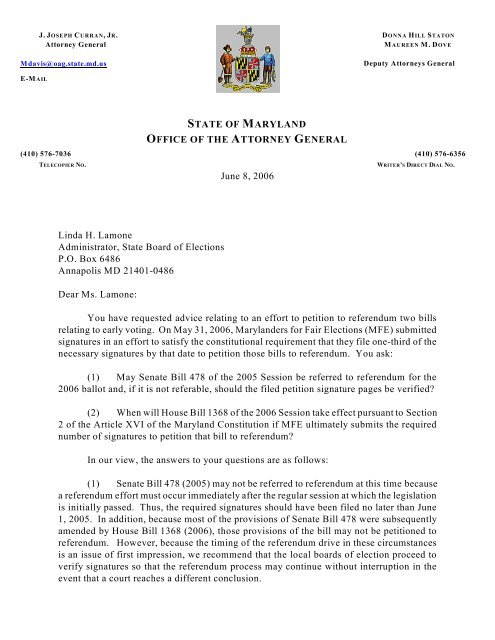
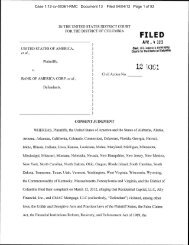
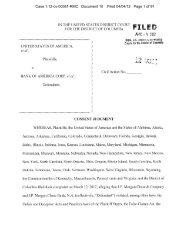
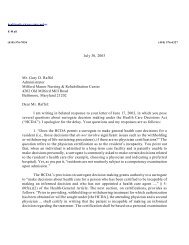
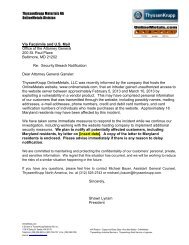
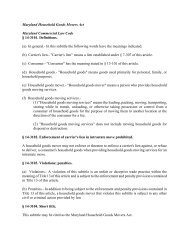
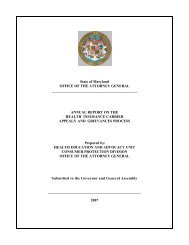
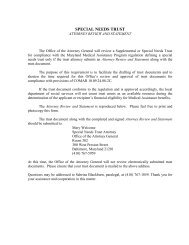
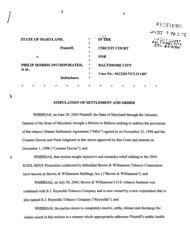
![[name of organization] THIRD PARTY CONTRACTS From time to ...](https://img.yumpu.com/24863110/1/190x245/name-of-organization-third-party-contracts-from-time-to-.jpg?quality=85)
